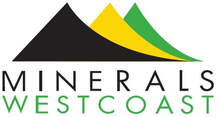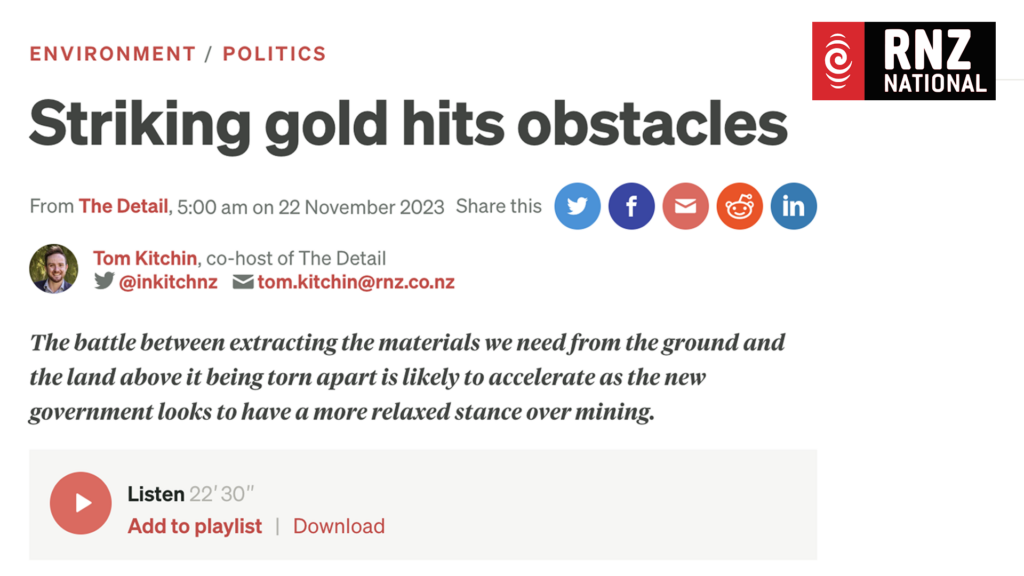On Wednesday the 22nd of November, RNZ’s evening show The Detail broadcast an episode titled Striking gold hits obstacles that focused on mining in Coromandel and the West Coast regions.
I believe it serves as a stark example of how media can too easily fall short of being serious and responsible when discussing complex topics such as mining.
Please feel free to listen to the episode yourself.
Host Tom Kitchin largely based the episode around two guest interviews. First, Newshub reporter Isobel Ewing shared her views, and later returned for final comments, for a total of about 13 of the total 22-minute airtime. University of Canterbury engineering and mining geology professor David Bell was given about seven minutes.
Nobody from a mining company, even those specifically mentioned in the episode, was interviewed.
I will resist the urge to bore you with the needlessly loaded language used by Kitchin or the invisible hand of the editor throughout the written article and the broadcast/podcast, and instead focus on what I feel are the most glaring omissions.
Ignoring value of mining within the region
While the episode featured much discussion of the opposition to mining, there was no mention of why many Coromandel residents would (and do) support mining in their region.
Mining is the single largest source of GDP within Hauraki District. In 2022 it accounted for 18.9% ($232,000,000) of the district’s GDP. Since the year 2000 mining has averaged more than 20% of GDP.
There was also no mention of the fact mining in Hauraki ranks 7th in employment, with 362 filled jobs in 2022. Given the high median earnings in the sector, we could assume mining accounts for about $30 million of local incomes each year.
A sensible and reasonable – not to mention balanced – discussion of mining in Coromandel would at least take a moment to acknowledge these figures.
Implying (or assuming?) that Coromandel resident are anti-mining
Any casual listener to the episode would understandably be left with the impression Coromandel residents broadly oppose mining.
Views aired in the show included one unnamed Coromandel resident saying she felt mining was “inappropriate”. Epsom-based Morgan Donaghue, head of anti-mining group Ours Not Mines and Catherine Delahunty, a former Green Party list MP and member of ant-mining group Coromandel Watchdog also voiced their opposition.
The aforementioned professor David Bell was essentially a lone non-opposition voice.
But is there any real evidence that the Coromandel is widely and vehemently anti-mining as presented? Quite the contrary.
The show itself pointed out that National, ACT, and New Zealand First are known to be parties that support mining. That said, we could safely assume that anyone who was significantly opposed to mining in the Coromandel would almost certainly not vote for any member of our incoming coalition government.
And yet, we see the Coromandel party vote overwhelmingly sided with the coalition parties (65%) while only delivering a combined 27% to the Labour and Green parties.
And this is no anomaly. National has held the Coromandel seat in all but one election since 1996.
Far from The Detail’s protesting Green-voters who believe mining is “inappropriate”, a sensible and responsible representation of Coromandel residents would be dominated by National-voters who don’t appear to have any major concerns with mining in their region, if any at all.
Conservation threats to Archey’s frog
Tom Kitchin asked Isobel Ewing about the conservation sensitivities of the site of OceanaGold’s proposed mine beneath Wharekirauponga, at which point Ewing mentioned the resident Archey’s frog. Through what was said, and what wasn’t, the listener would easily be left with the impression an otherwise safe frog is threatened due to mining.
What wasn’t mentioned is that, in the absence of mining, the future of Archey’s frog is far from secure. Information on the decline of the species is publicly available from the Department of Conservation, the New Zealand Herpetological Society, and Te Ara Encyclopaedia. You will read a common thread of key threats to the ancient amphibian – introduced pest and predators, as well as the chytrid fungus.
Mining, if not managed appropriately, can have an impact on native species and habitats. But for this proposed underground operation, it is worth considering that any surface impact within Coromandel Forest Park will be limited to four ventilation shafts. The total area of disturbance at ground level will be all of 0.06 hectares – 0.00008% of the entire 71,899 hectare forest park, or eight parts per ten million. Imagine eight millimetres among ten kilometres – that’s the proportion of the impact above ground.
Minimising the impact is only the first step. OceanaGold’s owners, staff, and consultants have proposed in their resource consent application is a series of pest control measures totalling more than 25% of Coromandel Forest Park – almost 19,000 hectares. If this mine is established, it will be because, in pursuit of resource consents, pest animal control and other measures lead to an overall gain for the environment.
It was in 2010 that Jan Wright, as Parliamentary Commissioner for the Environment, noted “…there is potential for a win-win. The greatest threat to New Zealand’s unique biodiversity on the conservation estate is not mining but introduced pests…’’.
Wright outlined the impacts of introduced pests, and the need for pest control, writing: “Current and projected funding will not be enough to stop pests wiping out much of our unique biodiversity. Commercial use (including mining) of the conservation estate offers an opportunity to address some of that funding shortfall.’’
The report on the issue is worth a readfor anyone wanting to take a serious and responsible approach to tackling pest control in New Zealand, and managing the impact of mining on public conservation lands.
Summary
The above information is more than relevant to the conversation carried out on the Detail on Wednesday the 22nd of October. It’s vital to it.
Finding the answers to this countries issues necessitates a higher quality of discussion than I think took place on that episode.
I would hope in future RNZ and other media outlets give these issues the seriousness they deserve.
Patrick Phelps
Patrick is the manager of Minerals West Coast, based in Hokitika. He is the son of a miner, has worked in pest-control, and is a former RNZ journalist.

